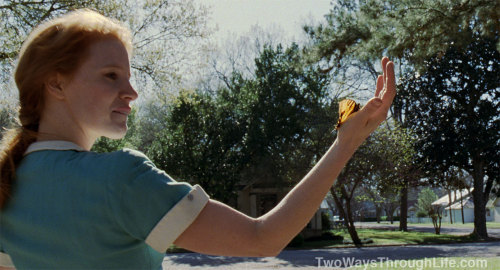
I watched Terrence Malick’s 2005 film The New World twice in one day when I had the flu. A historical drama retelling the Pocahontas legend, the film submerges the viewer in natural images and sounds, recreating a landscape in the last stages of its innocence. Malick’s new film The Tree of Life, shares with its predecessor an obsession with origins, guilt and grace, and a sensuous cinematographic style which intoxicates through fragments.
In attempting to stage the story of one mid-century American family against the creation and development of the planet, the film revives an old method of Epic: the nuclear family as a metaphor for the drama of all natural existence. The film begins with news of a son’s death, a grief still present as the adult Jack (played by Sean Penn) remembers his childhood in Texas. These are memories are lush snapshots of a southern boyhood which seesaws between domination by an authoritarian father (Brad Pitt), who asks his sons to kiss him and to call him sir, and the radiant grace of a mother (Jessica Chastain) whose whispered voiceovers haunt the film (‘Light of my life, I search for you, my hope, my child’). Split between nature and grace, the boy Jack struggles beneath his father’s oppressive discipline, praying to be good but acknowledging his tendency towards misbehaviour.
Though the Tree of Life won the Palme d’Or at Cannes this year, the reviews have been divided. Two complaints have caused the film to be heralded as a masterpiece that is inescapably flawed: its form, and its visual overindulgence. The splitting of the narrative by the Big Bang and slow development of planetary life lushly reminiscent of an Attenborough documentary, complete with dinosaurs (which caused several in the Phoenix Picture House to snigger and walk out), is almost unfathomable. The beauty of the actors and the caress of the cinematic lens prompted Michael Newton to liken the film (at its worst) in the Guardian Review to certain ‘perfume ads’, with the film’s good-looking actors as the southern equivalent of the Drapers, the central family in AMC’s Mad Men.
While I agree with Newton’s reservations and admit that the film is flawed, the film is also resonantly masterful. From the epigraph taking from Job, Malick proves that regardless of one’s personal orientation to faith, the Old Testament is still a potent source of mythmaking in a post-Christian age. The Tree of Life is a Genesis story: a tribute to innocence and fall, the family as a seed of love and life, evil, death and grief.
The camera-work is – and it is hard to avoid this word – transcendent. Paired with the soundtrack’s continuous wave-like musical cadences, the cinematography focuses on fragments of an ordinary and ecstatic life: a baby’s foot cupped in adult hands, sunlight in auburn hair, rivulets, magnolias, a toad strapped to a rocket, a ladder in the desert, a tree in the metropolis.
I believe this is a film which succeeds more than any other I have seen in fully realising the dimensions of what cinema does. In 1926 Virginia Woolf suggested that cinema ‘has within its grasp innumerable symbols for emotions that have so far failed to find expression’, The Tree of Life holds the key to the solution. In a supple working of what Wagner called ‘gesamtkunstwerk’, the unification of all the arts, Malick has produced a film relentlessly alert to microscopic beauty, to a life aesthetic which is attuned to the connection between things, between mankind and the planet, between fathers, mothers, and sons.
Comments
I think the film is a masterpiece, even if people keep walking out of the theater. Still, like you say, it suffers from Malick's habitual weaknesses: indulgence, sentimentality, and a lack of humor.
Can you imagine Malick with a sense of humor?